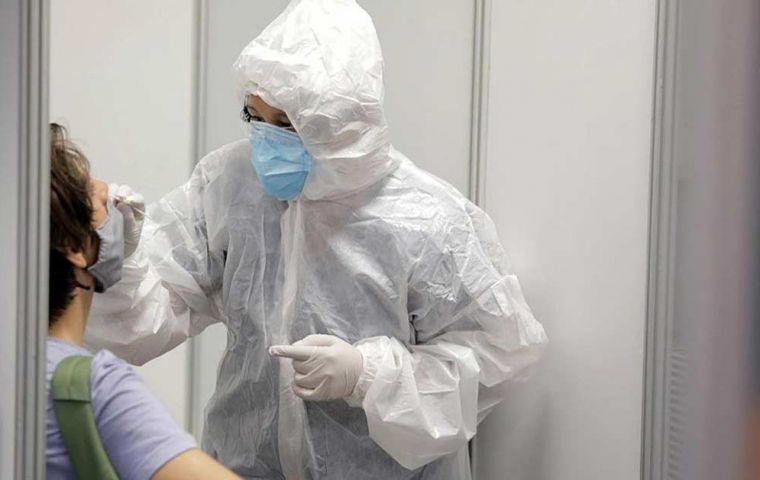
BUENOS AIRES, Aug 2 (NNN-MERCOPRESS) — Argentine health authorities have reported over the weekend a significant increase in the number of COVID-19 cases nationwide last week (52,745 ), a 26% increase over the previous week.
The country’s epidemiological report also showed 91 coronavirus deaths, 19.73% more than the 76 deaths recorded a week earlier.
The province of Buenos Aires accounted for the bulk of the casualties with 32 of them, followed by Córdoba (11), Entre Ríos (9), Buenos Aires City (9), Salta (7), Mendoza (6), Chaco (4), Santiago del Estero (3), La Pampa (2), Neuquén (2), Río Negro (2), Santa Fe (2), San Juan (1) and San Luis (1).
It was the fifth consecutive week infections kept rising. In June, the curve went down week by week, but it bounced back last month, with 464 hospitalizations in intensive care units reported, which was tantamount to 43.9% of bed occupancy for all ailments. It also meant an increase from the 456 people hospitalized due to COVID-19 the previous week.
Argentina’s Public Vaccination Monitor also showed the total number of doses applied against COVID-19 reached 107,823,754. The document also highlighted 3,133,494 people had received an additional dose, 20,966,625, the first booster, and 5,120,991, the second booster.
Today the Omicron BA.5 subvariant predominates in most of the samples tested from people with COVID-19 infection in the world. In Argentina, the spread of the BA.5 subvariant is also increasing. Still, people are reluctant to get vaccinated or to additional doses.
Experts in sociology, psychology, and vaccinology told Infobae that those who hesitate believe that the infection can no longer affect them seriously, do not want to experience the mild or moderate side effects, or are unaware that boosters are key to protecting themselves and others.
According to official data, 91.7% of the population aged 18 years and older received the primary two-dose schedule, but only 57.2% of adults received at least one booster dose. In younger age groups, booster application is even lower. Only 40% of young people aged 25 to 29 years, 38% of those aged 16 to 24 years, and 33% of adolescents agreed to apply the first booster so far.
Since the last week of May, the rate of COVID-19 vaccine applications has been decreasing: from 967,733 doses that week to 387,834 in the week of July 18. — NNN-MERCOPRESS






